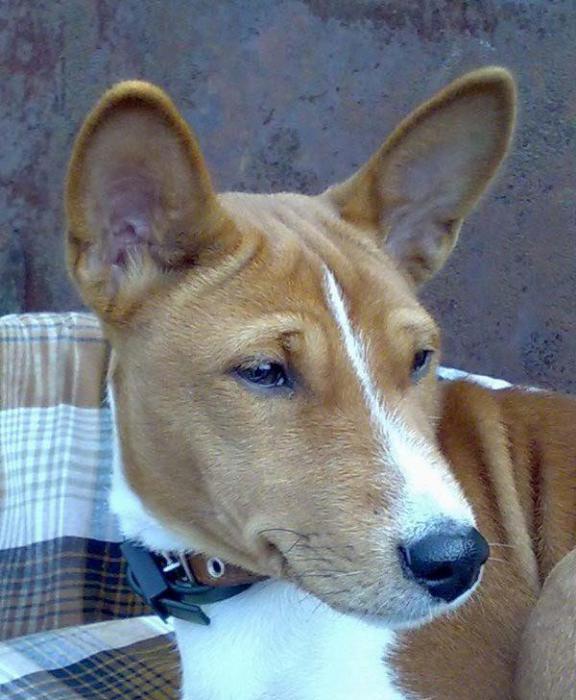Among dogs there is one very interesting breed called Basenji, or African Silent. It was formed naturally, without human intervention, several thousand years ago. A distinctive feature of the basenji is that these dogs, instead of barking, make rumbling sounds, like snorting or stifled laughter.
Appearance
African Silent - a dog with a muscular body with a light skeleton and high legs. Its body is proportional, with a wide straight back and deep chest. The head is set high, which gives the animal a proud look. The tail is tightly twisted into a ring that fits snugly against the croup. Ears are erect, slightly inclined forward. There are characteristic wrinkles on the forehead, which are especially evident in puppies. Dark-colored almond-shaped eyes make the dog look expressive and intelligent.

Short hair is smooth, silky to the touch and very dense. It has a number of advantages - it does not fade, does not cause allergies, in addition, even with high humidity it does not have an unpleasant odor. Color can be black and white, red-white, brindle or tricolor, when black and white are combined with a red tan. All marks are well-defined, clearly defined. Whatever color the African silent man has, the description of the breed requires that the paws, tail tip and chest be white. Height at the withers is 40–43 cm, weight - from 9 to 11 kg.
Story
Tracking the breed began about 5,000 years ago. The birthplace of these dogs is Africa. Their images in the form of bas-reliefs, statuettes were found on the tombs of the pharaohs. Embalmed canine bodies soaked in incense were discovered during excavations next to their masters. This suggests that the African taciturn is a breed that has been very revered. And today, on this continent, basenji is considered a family amulet, an animal that brings happiness and joy. Researchers who arrived in the Congo at the end of the 19th century drew attention to dogs with amazing hunting abilities, driving game nets. From Africa, several individuals were exported to England in 1885, but, unfortunately, did not survive. Nevertheless, it was in this country that the African silent standard was subsequently approved, which is still valid today.

The next attempt to take the dogs out was more successful. It took place in 1937, when the basenji first appeared in the United States, and later in Europe. Gradually, residents of many countries, who fell in love with self-confident and fearless dogs, were able to get acquainted with this breed. In 1988, World Cynological Organizations officially approved it.
Character
Dogs have earned an excellent reputation throughout the breed. Basenji are flexible in nature, but do not show servility. Infinitely loyal to their master, they are at the same time respectful to other members of the family. They are non-conflict, try not to enter into a fight, even if it is provoked by someone. This indicates a high degree of poise, which the African silent man can boast of. Owner reviews about this breed are mostly positive. Owners are usually very pleased with the behavior of the dog and note the complete absence of aggression in its character.
Many of them are attracted by the extraordinary cleanliness and neatness of the basenji. After each meal, the dog carefully wipes its face, and takes care of its hair with the help of the tongue, constantly licking it, as cats usually do.
The breed of dogs is an African silent man, which is a hunting dog, therefore its representatives have a very sensitive sense of smell and a developed instinct for persecution. If you have to chase after prey, then you must certainly overtake it. Moreover, the dog is so passionate about this that it can get lost.
Family relationship
African Silent - a dog ideal for a home in which there are small children. They easily find a common language with each other, participate in joint games. True, the representative of this breed is not one of those who allow you to do anything with yourself, so you should not leave it alone with your child.
With other animals in the house, the basenji will get along only if they allow him to dominate. Then the relations between them will be friendly and even develop over time into a strong attachment. At the same time, the size of the friend does not matter at all - the African silent man will be friends with a huge dog, which is much larger than himself, and with a hamster. You can keep several of these dogs at the same time.
Breed features
The main thing that makes Basenji stand out from all the other dogs is the lack of barking. There are two versions to explain this feature. According to one of them, it is believed that hunting in conditions of almost absent vegetation, game was not required to lure from the forest, but it was necessary to sneak up on it. Therefore, barking dogs gradually forgotten how unnecessary. Another version explains the absence of barking by the fact that the African silent is a very old breed, formed from ancient dogs that did not know how to bark.
These animals are unusually mobile and very active, as befits real hunters. They constantly strive to run somewhere. This is a vital necessity for them. At the same time, the dog behaves quite calmly and quietly in the apartment. But as soon as she gets out of the house, all her life potential is revealed.
South African Silent is very negative about swimming. Perhaps this is due to genetic memory, reminiscent of crocodiles living in water. Therefore, do not force the pet to swim.
Basenji is sometimes called a cat dog. And there are reasons for this. In addition to their amazing cleanliness, their behavior in the house is very similar: just like a cat, an African silent man moves smoothly and silently, makes rumbling sounds, washed his foot and can even walk into a tray.
Care and maintenance
The small size of the dog, the inability to bark and extreme neatness make it one of the most suitable breeds for living in an apartment. Caring for her is practically no different from caring for any other pet. Basic hygiene procedures come down to rubbing your eyes, clipping your teeth, and cleaning your ears. Short hair does not need to be combed out; you just need to wipe it with a hard glove sometimes to get rid of dead hairs.
You can wash them only in case of emergency - probably no one is so afraid of water as the African silent. The dog’s description above explains the likely causes of this fear. In order for the pet not to freeze on a walk in severe frost, you can purchase special clothes for him. Regular treatment procedures for parasites and timely vaccination are mandatory.
It is worth considering that these dogs are very active, easy to climb and need long daily walks. Tiring them is almost impossible. At home, a basenji will be a quiet and calm dog only if it is well walked. Otherwise, he can splash out his energy, disgraceful in the apartment.
Feeding
Despite his incredible mobility, the African silent person is prone to obesity. Reviews about the breed of owners of these dogs note the demanding food for their pets. Many note that they lack a sense of proportion. Basenji can eat as much as is suggested. We have to monitor the moderation of portions. In the diet must be present meat of low-fat varieties. In addition to it, they include a little fish, offal, porridge in the menu. Occasionally, no more than once a week, bones can be given. Puppies need dairy products and cottage cheese.
The use of ready-made dry food in the diet of basenji is not recommended. Food from the owner's table is not good for these dogs. Salted, smoked, spicy, fatty and sweet foods are contraindicated for them.
Parenting and training
An African silent can become a true friend and companion for a person. The description of this dog marks its high mental abilities and quick wits. However, no matter how smart the dog is, it needs to be raised and trained. Basenji are pretty easy to learn and understand the teams very well. The approval of the owner is very important for them, so an affectionate word and praise are the main method of training. In addition to teaching the dog to respond to his name and approach the owner, it is very important that the pet understands forever that nothing can be picked up from the ground. Silent African refers to the breed of dogs that love to “play a fool,” that is, on occasion, will not miss the opportunity to grab some carrion or old bone.
During training, it is unacceptable to mistreat a dog and increase his voice. For each execution of the team must be followed by praise. The memory of these dogs is excellent. They are able to learn all the teams the first time.
Health
Due to the fact that the breed was formed in natural wild conditions, its representatives have excellent health. However, an affinity for certain diseases is available. Most often, these dogs have atrophy of the retina, cataract, entropy with loss of protein, urolithiasis.
Approximately every six months it is recommended to visit a veterinarian, so that in case of a health problem, treatment is started on time.
Today, the breed is quite rare African silent. A nursery engaged in its breeding can be found far from every city. The cost of these dogs cannot be called low. Therefore, deciding to get a Basenji puppy, it is best to contact the monobreed kennel, where experienced breeders will assist in choosing a future friend and raising him.